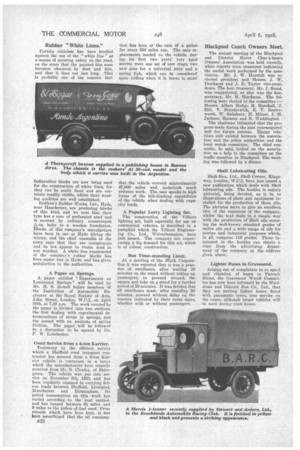Rubber "White Lines."
Page 6

If you've noticed an error in this article please click here to report it so we can fix it.
Certain criticism has been levelled against the use of the "white line" as a means of securing safety on the road, on the score that the painted line soon becomes obscured by dust and dirt, and that it does not last long. This is probably one of the reasons that Indiarubber blocks are now being used for the construction of white lines, for they can be easily fixed and are certainly readily visible, whilst their wearing qualities are well established.
Redfern's Rubber Works, Ltd., Hyde, near Manchester, are producing blocks of this kind, and we note that their type has a core of perforated steel and is secured by ordinary countersunk
bolts to a wooden foundation. Mocks of this company's manufacture have been in use at Hyde airing the winter, and the chief constable of the town says that they are conspicuous and do not appear to retain mud in wet weather. A white line constructed of the company's rubber blocks has been under test in Hyde, and has given satisfaction to the authorities.
A Paper on Springs.
A paper entitled " Experiments on Laminated Springs" will be read by Mr. H. S. Rowell before members of the Institution of Automobile Engineers at the Royal Society of Arts, John Street, London, W.C.2, on April 90th, at 7.30 p.m. The work covered by the paper is divided into two sections, the first dealing with experimental determinations of stress in springs, and the second with an analysis of spring friction. The paper will be followed by a discussion to be opened by Dr. F. W. Lanchester.
Good Service from a 6-ton Rarrier.
Testimony to the efficient service which a Sheffield road transport contractor has secured from a 6-ton Karrice vehicle is contained in a letter which the manufacturers have recently received from Mr. E. Clewley, of Shiregreen. The vehicle was put into service on November 5th, 1923, and has been regularly engaged in carrying 6-5ton loads between Sheffield, Liverpool, Manchester and Birmingham. Its petrol consumption on this work has varied according to the load carried, and has ranged between 61 miles and 9 miles to the gallon of fuel used. From records which have been kept, . it has been ascerthined that the oil consump B22 tion has been at the rate of a gallon for every 550 miles run. The only replacements needed to the vehicle during its first two years' very hard service were one set of new rings, two new pins for a universal joint and a spring link, which can be considered quite trifling when it is borne in mind that the vehicle covered approximately 47,000 miles and undertook much arduous work. The user speaks in high terms of the hill-climbing capabilities of the vehicle when dealing with capacity loads.
A Popular Lorry Lighting Set.
The construction of the Villiers lighting set, built especially for use on commercial vehicles, is described in a pamphlet which the Villiers Engineering Co., Ltd., Wolverhampton, have just issued. The company are experiencing a big demand for this set, which is of robust construction.
Bus Time-standing Limit.
At a meeting of the Blyth Corporation it was reported that it was a practice of omnibuses, after waiting 20 minutes on the stand without taking up passengers, to proceed around, the square and take up a stand for a further period of 20 minutes. It was decided that all omnibuses must, after standing 20 minutes, proceed without delay on the journey indicated by their route signs, whether with or without passengers.
Blackpool Coach Owners Meet.
The annual meeting of the Blackpool and District Motor Char-a-bancs Owners' Association was held recently,
when reports were presented indicating the useful work performed by the asso ciation. Mr. X. W. Borstall was reelected president and Messrs. .1. W. Dewhurst and J. E. Taylor vice-presidents. The hon. treasurer, Mr. J. Stead, was reappointed, as also was the hon. secretary, Mr. H. Hardman. The following were elected to the committee :— Messrs. Albert Hodge, R. Marshall, "S. Hill, V. Standerwick, E. T. Butterworth, W. Salisbury, H. Milner, 3: H. Jackson, Spencer and N. Waddington. •
The chairman intimated that the progress made during the past yeargaugured well for future success. Happy relations still existed between the association and the police authorities and the local watch committee. The chief constable, be said, looked on the association as a help to the committee on the traffic question in Blackpool. The meeting was followed by a dinner.
Shell Lubricating Oils.
Shell-Mex, Ltd., Shell Corner, Kingsway, London, W.C2, have just issued a new publication which deals-with Shell lubricating oils. The booklet is mainly pictorial, being devoted, as it is, to illustrations of plant and equipment installed for the production of these oils. The pictures serve to give an excellent idea of the resources of the company, whilst the text deals in a simple way with the production of Shell oils covering the well-known standard grades of motor oils and a wide range of oils for marine and industrial purposes which, in all, comprise 118 grades. Those interested in the booklet can obtain a copy from the advertising department of the company at the address given above.
Lighter Buses in Gravesend.
Arising out of complaints as to speed and vibration of buses in Parrock Street, the Gravesend Watch Committee has now been informed by the Maidstone and District Bus Co., Ltd., that they are putting lighter buses, fitted with pneumatic tyres, into service on the route, although larger vehicles will be used during rush hours.
































